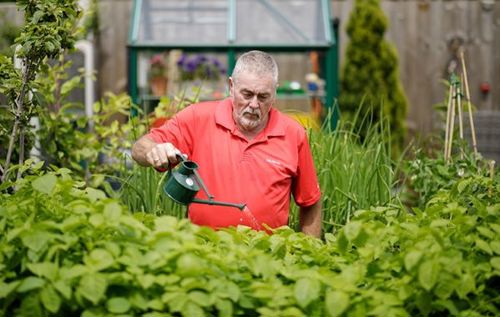How to look after your mental health when you have arthritis
30 January 2023
Living with arthritis not only affects your physical health. The truth is it can be tough emotionally too. It’s not uncommon to feel low, isolated, or just a bit overwhelmed when you’re dealing with fatigue and pain.
If this sounds familiar, we're sorry to hear that things have been tough. These emotions are normal, but that doesn’t make them any less difficult.
At times like this, it can help to know that you don’t have to face this alone. Our free helpline can offer a listening ear, or you can share your stories and problems with our online community where you can talk to other people with arthritis.
There are also small steps that you can take to look after your own mental well-being. Why not try some of the tips below? Some of these might not suit everyone and that’s okay. It’s all about finding what works for you.
Keep up the activities you enjoy as much as possible

It might feel like the last thing you want to do when you’re tired or in pain. But, where possible, try to keep up with the activities you enjoy.
It’ll help you unwind, provide a sense of achievement, and maybe give you a chance to catch up with friends.
If you don’t know where to start, you could try a new activity. For instance, you could try gardening, reading, cooking, or a physical activity – the list is endless!
If you’re struggling to keep going with your hobbies, why not see if there is any way you can adapt the activity to make it a bit easier? For example, you could try:
- Pacing yourself and taking more breaks.
- Asking a friend for help with more demanding tasks.
- Using aids and adaptations.
- Practising joint protection and changing the way you do things.
Sukhjeen 20, lives with inflammatory arthritis. She says that creating digital illustrations helps her cope with her condition.
“My art gives me the ability to share my feelings through images," she says. "Sometimes they show the frustration of how it feels to be chronically ill or sometimes I use them to create gifts for loved ones.”
Get a good night’s sleep
We know it can be difficult to drift off to sleep if you’re in pain. But there are small steps you can take to try and sleep better. You could:
- Switch off your phone and other devices an hour before you want to sleep.
- Unwind before going to sleep (e.g., by going for a bath, meditating, or doing some gentle stretches).
- Making your room cool, dark and clutter-free.
- Take your pain medication an hour before you want to sleep so that you’re comfortable.
Stay active

Keeping moving is important for your physical health, but it’s also great for your mind.
That’s because, when we exercise, our body releases ‘feel-good’ hormones called endorphins and serotonin, which improve our mood.
If you want to add more movement to your life and want a helping hand, check out our free physical activity programme, Let’s Move with Leon.
It’s packed with tips and advice on getting started, as well as videos of gentle exercises you can try at home.
Learn more about exercising with arthritisGet the support you need
You don’t have to face any mental health struggles alone. Remember there are a whole host of different people who can help you, including your healthcare team.
For example, you could ask your GP to refer you to a self-management course. This might build your confidence and make you feel more able to cope with your condition.
Or, if you’ve been feeling anxious or low for a while now, your GP may refer you to a counsellor or therapist. They’ll help you navigate difficult thoughts or feelings, and teach you coping techniques you can use on difficult days.
Dave, 54, who has spinal osteoarthritis, says: “I’ve had support from the adult mental health team for about three years. For other [people with arthritis], I would always recommend finding someone to confide in.”
Stay connected with friends and family
It’s important to chat with your loved ones about what you’re going through. It’s okay to let them know that you’re in pain or struggling. Sometimes a heart-to-heart is exactly what we need when we're having a tough time.

You could grab a coffee with a friend, have a phone call with a family member, or if you're unsure who to speak to, you can always connect with people through our online community or helpline.
“Becoming more open about my relationship with arthritis and pain has helped with my mental health and relationships with my support network," says Kalifa, 20, who has rheumatoid arthritis.
"I’m quite a strong person but I’m learning that it’s ok to tell people when you’re in pain,"
Challenge negative thoughts
At times, we can be very hard on ourselves. If you’re dealing with negative thoughts about yourself, it can sometimes help to ask yourself if you would speak to a close friend this way.
You could also ask yourself if there’s any evidence that challenges this thought. The situation might not be so black and white as you think.
It can also help to write down what’s on your mind. “When things get stressful and overwhelming, I like to take a few mindful moments to process the issue and journal how I am feeling,” says Sukhjeen, 20, lives with inflammatory arthritis. “This helps me figure out a solution and prevent unnecessary pain.”
Set goals
Some people find it helpful to set goals for themselves because it can be a clever way to build up your confidence and motivation.
Start small and be realistic. If you’re dealing with a lot of pain and feeling low, your goal might be something as simple as getting out of bed, brushing your teeth, and showering.
On better days, you could try to push yourself farther and achieve a bigger goal. You could try to add more movement to your life and walk for 10 minutes around the park, for example.
Show yourself some compassion
Dealing with pain and fatigue whilst going about your day-to-day life is a challenge so, above all else, show yourself some compassion.
You might be experiencing some uncomfortable emotions, but if you have a difficult day, remember it won’t feel this way forever. These feelings will eventually pass and tomorrow, or the next day, will be a little easier
We’re here whenever you need us
Remember you don't have to face your pain alone. If you want help, support or information, get in touch. You can:
- Call our Helpline on 0800 5200 520 (Monday to Friday, 9am to 6pm)
- Talk to our arthritis virtual assistant, 24/7
- Take a look at what's on in your area
- Join our online community
- Follow us on Twitter, Facebook and Instagram
What to do in a crisis
If you feel like you might harm yourself, or someone else, this is an emergency that needs medical help. Talk to your doctor immediately, call 999 or go to your local hospital’s A&E department. They will understand and are trained to help.
You can also call Samaritans for free anytime on 116 123.
You might also be interested in...
-
How to cope with anxiety or depression as a young person living with arthritis
Professor Yeliz Prior shares her tips and advice for looking after your mental wellbeing as a young person living with arthritis.
-
Stress and arthritis: Why it’s important to manage your stress levels
We all get stressed from time to time. But there are coping skills we can learn to help us better manage it. Here Yeliz, who lives with axial spondyloarthritis, shares why it's important to manage your stress levels.